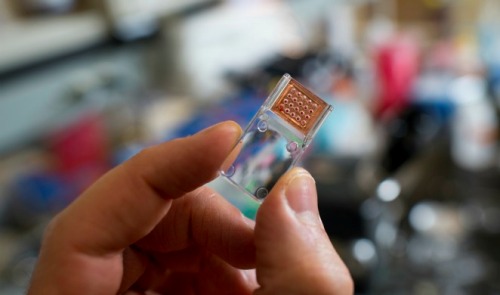A team of researchers led by Linda Pilarski from the University of Alberta has developed a lab-on-a-chip called the Domino, which can perform 20 different genetic tests within a fraction of time and with similar accuracy as highly sophisticated laboratories.
 The Domino technology uses a plastic chip that can perform 20 genetic tests from a single drop of blood.
The Domino technology uses a plastic chip that can perform 20 genetic tests from a single drop of blood.
The key component of the Domino technology is a tiny plastic chip engineered with nanotechnology to detect whether a patient has diseases such as malaria or shows resistance to cancer drugs. The chip is also useful to detect infectious diseases in livestock. The technology has been licensed to Aquila Diagnostic Systems, a nano startup company based in Edmonton, Canada.
The Domino uses polymerase chain reaction technology that is utilized for amplification and detection of targeted DNA sequences, but small enough to fit into a plastic chip measuring the size of two postage stamps. The chip consists of 20 pinhead-sized gel posts that can detect DNA sequences with a single blood drop.
Each post carries out its own genetic test, which means that the device not only detects the presence of malaria in a patient but also finds out the type of malarial disease and whether the patient shows resistance to specific antimalarial drugs. A chip can complete the process in less than an hour, thus requiring a short time to diagnose large populations.
Alberta Innovates Health Solutions awarded a five-year grant worth $5 million to Linda Pilarski’s team in 2008 for fine tuning and commercializing the Domino technology. The innovative technology is versatile, portable and affordable, making it an ideal solution for point-of-care medicine. Moreover, the device is rugged and user-friendly. Aquila Diagnostic Systems will first introduce the device in the livestock industry. The company will test the device within a year at a major feedlot located in southern Alberta.